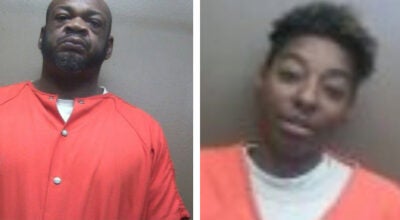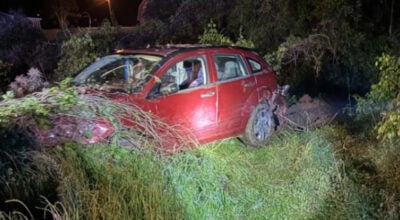Trial for teen accused in 2014 murder begins
Published 12:02 am Tuesday, November 24, 2015

Eddie Minor III awaits opening statements at Monday’s trial. Minor is accused of robbery and fatal shooting of a 16-year-old acquaintance in December 2014. (Tim Givens/The Natchez Democrat)
NATCHEZ — Defense attorneys characterized the armed robbery and murder case against Eddie Minor III Monday as a flimsy set of circumstances with little hard evidence and a foundation that rests on the testimony of a co-defendant with everything to gain by Minor’s conviction.
In some ways, Monday was a trial in absentia of the co-defendant.
Minor, 18, is charged with the Dec. 28, 2014, shooting death of Jessie Taylor, 16, in the area of Beaumont Street.
In his opening statement, Assistant District Attorney Tim Cotton laid out what the state planned to prove, saying on the night of his death Taylor had ridden to a house on Beaumont Street, where he met up with Minor and his co-defendant, Emanuel C. Latham Jr., and asked for synthetic marijuana.
Cotton said Latham will testify that Minor told Taylor he had the drugs, and the three walked down the street to another residence, where the defendants walked inside after telling Taylor to wait in the yard.
Latham’s testimony will be that Minor retrieved two guns from the back of the house, handing one to Latham, and — when questioned — told him to follow his lead. Minor them walked out, and — brandishing the weapon — told Taylor to give him the money in his pocket, Cotton said.
Testimony would also show that Latham tried to unsuccessfully wrestle a gun from Taylor, who ran from the scene, with Minor firing after him, Cotton said, and Latham’s testimony will include an assertion that Taylor turned around and fired a shot back at the pair after he appeared to have been struck with a bullet.
Latham will admit to firing back, Cotton said, and other witnesses will say they did not see Taylor fire back until he had nearly reached the end of the street.
But attorney Carmen Brooks, who is representing Minor, told the jurors to pay attention to what is said “but also what is not said.”
“The state has decided to build its case on the testimony of a co-defendant,” she said. “That means that Emanuel Latham is charged with the exact same crime as my client, but he is not on trial today, my client is. Mr. Latham, for his testimony, expects some kind of leniency. How can you trust the testimony of Emanuel Latham when he has more to lose than anybody and has more to gain from my client being guilty?”
Latham, who was 15 at the time of the shooting, is no choirboy, Brooks said.

Defense attorney Carmen Brooks reads opening statements at Monday’s trial of Eddie Minor III, who is accused of robbery and the fatal shooting of a 16-year-old acquaintance in December 2014. (Tim Givens/The Natchez Democrat)
“He may come up looking like a babyface schoolboy, but when he takes the stand, you will be looking at a cold-hearted killer,” she said. “He is going to say, ‘I was shooting in self-defense, but you will need to question, ‘Why would you have to defend yourself if Eddie Minor was the aggressor?’”
Even though Latham did not take the stand Monday, Brooks worked early to undermine his credibility as a witness, at one point pitting his statements to police against the final words of the victim.
Detective Paulesha McBride — who at the time was a patrol officer — was the first responder on the scene of the shooting, and testified she found Taylor on the ground on Prentiss Street, across Woodlawn Avenue from Beaumont Street.
“He was in pain, he was constantly saying, ‘Please don’t let me die, it hurts so bad, it burns, don’t let me die,’” McBride said.
“He said two black males approached him, asked him for everything in his pockets and when he said he didn’t have anything, they took out guns and started shooting.”
Investigator Otis Mazique likewise recapitulated McBride’s testimony, saying Taylor lost consciousness before he could identify his assailants.
“I waited until he finished saying what he was saying, and I laid him back and asked him, ‘Who was that?’ But he was already passed out,” Mazique said.
Brooks asked why Latham’s statements were given the weight they were when at apparent odds with the victim.
“Do you think Jessie lied?” she asked Mazique. “You know that the victim, his dying words were that he didn’t have any money, and you understand that to be in direct contradiction to what the co-defendant, Emanuel Latham, said.”
She likewise spent a considerable amount of time questioning the technique and the dedication of the investigation, including one instance in which two reported witnesses came in to give crime stoppers information but did not give written or recorded statements.
When prompted by Brooks, Mazique testified that while the police did search a house where they had been told they could find weapons, they did not search Latham or Minor’s residences, nor did they examine the Latham or Minor’s phones.
Mazique said police did subpoena phone records, and the records apparently did not match up with Latham’s statements to police about when Minor called him that evening, asking him to hang out. Latham did not receive a call from Minor at the time he told police he did, Mazique said.
Brooks also grilled Mazique about collection of evidence on the scene, including seven bullet casings collected from where Minor and Latham were alleged to have been standing. The guns alleged to have been used were not recovered.
“How do you know I didn’t just take (the casings) out of my pocket and drop them on the ground?” she said. “You don’t know how long those shell casings have been on the street, and you don’t know that those shell casings had anything to do with this case.”
Police recovered a .380 semi-automatic handgun a short way from where Taylor was found, a weapon McBride said police were tipped off belonged to the victim.
Firearms tool mark examiner Carl Fullilove Jr., who works with the Mississippi State Crime Lab, said the bullets found in the weapon were not consistent with the projectile that was recovered from Taylor’s body.
Fullilove testified the recovered projectile was most consistent with a bullet that would have been used in a revolver. Cotton said Monday Latham’s testimony will be that he had a semi-automatic weapon while Minor had a revolver.
Testimony Monday also included Mississippi’s Chief Medical Examiner, Dr. Mark Levaughn, who testified Taylor died of wounds sustained from two gunshots to the back.
Judge Forrest “Al” Johnson said he expects the trial will conclude today.





